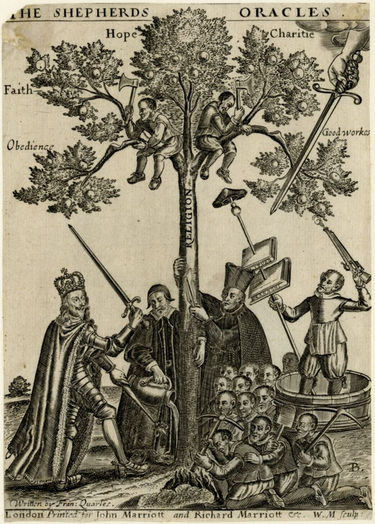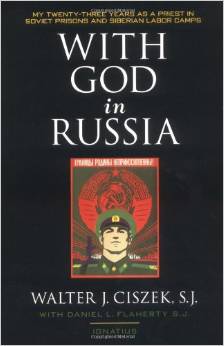Here we need to distinguish carefully between biblical Law and unbiblical Law. Biblical Law is what demands of us a work by which we merit God’s favor. For example, as Hans Wiersma puts it: “One common way in which law and gospel are confused is when we imagine that we can make ourselves eternally right with God by deciding to do what God wants us to do.”[1] Christian America, in a pseudo-Puritan and fundamentalist sense, wants us to reap certain Covenant Blessings by our willfully choosing to be Holy. While the Liberals fashion one Utopia along Socialist lines, Christian America attempts to fashion a Utopia along “biblical” lines. But is this really biblical?
Law and Gospel do not work in contradiction to one another but in tandem. Consider 1 Timothy 1:
"Now the end of the commandment is charity out of a pure heart, and of a good conscience, and of faith unfeigned: From which some having swerved have turned aside unto vain jangling; Desiring to be teachers of the law; understanding neither what they say, nor whereof they affirm. But we know that the law is good, if a man use it lawfully; Knowing this, that the law is not made for a righteous man, but for the lawless and disobedient, for the ungodly and for sinners, for unholy and profane, for murderers of fathers and murderers of mothers, for manslayers, For whoremongers, for them that defile themselves with mankind, for menstealers, for liars, for perjured persons, and if there be any other thing that is contrary to sound doctrine; According to the glorious gospel of the blessed God, which was committed to my trust."
When preaching Law, Paul is also preaching Gospel. “Now the end of the commandment is charity out of a pure heart, and of a good conscience, and of faith unfeigned.” The commandment brings us to charity out of a pure heart. “. . . we know that the law is good, if a man use it lawfully”. He then lists a bunch of wrong things that the lawless and disobedient do and then says all this is “according to the glorious gospel of the blessed God, which was committed to my trust.” Law is not opposed to Gospel, but works in tandem with it to bring sinners to a recollection of their sin and the need for the Gospel, and even this preliminary step in receiving the Gospel is still the Gospel – a prevenient or common grace, we might even say – a preparation for the Gospel, but still the Gospel.
So, there we are again, easy law leads to cheap grace. So often we think that the job of the minister and of the Christian is to be “nice” and to just do a little good and walk a little humbly. While we have to check ourselves to make sure that our way of preaching the Gospel is not works-based, haughty, hypocritical or self-righteous – do this and you will be happy and God will be happy – we have to preach the Gospel of Grace, in season and out of season, and that means Law too. Grace is Peace with God, not happiness. Grace brings us safely through this vale of tears not to an earthly kingdom of Christian America, or a worldly or temporal peace. Despite that, robust Law does lead, when the heart is broken and contrite, to strong or expensive Grace – not earned, but freely given to the broken and contrite heart by God’s unmerited favor. Despite that, a godly kingdom or nation can arise from ashes.
The minister of reconciliation, God’s ordained priest, is often thought to preach simply Gospel, which means only mercy and grace. But, as a minister especially, the Gospel is preached in the midst of the Law, not separated from it. There are times when, just short of being a “social justice warrior”, a minister, like a local judge or officer of the peace, must call the community on the carpet for unjust business practices, shoddy workmanship, horrible landlords slum-lording it over others, corporate corruption, as well as the idle workers and lazy poverty stricken, looking for “cheap grace” in easily received handouts. Even local judges should be rebuked by the minister. Hallgrímur Pétursson (1614-1674), as in his Passion Hymns, reflecting on Christ’s Judgment Seat poeticizes.
Laws codified and righteous
The Jews perverted here.
Let us all recollect this
And shun examples base.
Judgment belongs to God.
What though a spiteful plaintiff
Bring charges, pure truth twisting?
Let men of power beware![2]
Pastor Pétursson was not above being in conflict from his Icelandic pulpit with his local magistrate. The minister of reconciliation is not a social worker, but has a little bit more time (or at least more flexible working hours) than the average Christian to make an extra phone call to speak to customer service when the business has not been all that it can be, to make sure that the manager is notified when a food industry worker or waiter has been rude or even offered poor service. The minister of reconciliation should tip well, as if offering alms to a beggar, when services are performed well. The minister of the Gospel of Grace, according to the Law of Moses, should not let the sun go down before giving wages to the hireling and should not delay to repay any debt, or should not be indebted at all! This is being a minister of Law as well as Grace. Should he fail, becoming cognizant of his failure, there is Grace for him too!
Alfred the Great is that first English King that we really point to who called Anglo-Saxon England to righteousness by Church and State, by Grace and by Law – this according to his Dom Boc – His Law Book. There was no Cheap Grace in His Kingdom. Instead, one sees Lex Talionis at work, similar to the Law of Moses and the Code of Hammurabi, but, arguably with more Grace. After enumerating the Ten Commandments (while translating it in a way which could not be interpreted as iconoclast, contrary to the Seventh Ecumenical Council, i.e. as against images in the Church), Christian slavery is spoken of, but only for 7 years – then release. Female slavery is permitted, but a daughter cannot be sold further than among her own people, and if the master’s son sleeps with the female slave, she must be clothed with what “is worthy of her maidenhead, that is the dowry.” Murder requires capital punishment except “he who kills him out of necessity or unwillingly or accidentally . . . and he did not lie in wait for him, he will be worthy of life and lawful compensation” – here the weregild, man-gold, shall be paid. If it was premeditated murder, however, sanctuary will not be given, nor compensation be made; the murderer shall die.” “If one deceives an unwed virgin and sleeps with her, let him compensate her and have her thereafter as wife. However, if the virgin’s father does not wish to giver her, let him give the money according to the dowry.” Here, shotgun weddings are permitted, but the father may also protect his daughter and keep her at home and keep the dowry too!
And yet some things, witchcraft, bestiality, pagan sacrifice, are capital offences, while immigrants are protected. These are precisely according to the Law of Moses. He ends with words such as these.
"These are the laws which the almighty God himself was speaking to Moses and commanded him to hold. And after, the only begotten son of the Lord, our God, that is Healing Christ, came to earth and he said he did not come to break or suppress these commandments, but to increase them with all goodness, and he taught mild-heartedness and humbleness of spirit. Then after his suffering [passion], before his apostles traveled in different directions broadly all over the earth to teach, while they were still together, they turned many heathen peoples to God."
There is then a paraphrase concerning the Council of Jerusalem in the Book of Acts. “The apostles and the elder brothers wish you health and we make known to you that we have found out by asking that some of our companions came to you with our words and enjoined you to hold them in a heavier fashion than we enjoined.” The interpretation is that the Law of Moses is, as Alfred has done, to some extent to be held to but with grace and mercy.
"After that it came to pass that many nations accepted the faith of Christ. Then many synods were assembled all over earth, even as far as among the English, who then accepted the faith of Christ. Then the holy bishops and other excellent counselors, decided, for the mild-heartedness Christ taught, that for the great misdeeds secular lords might, with their leave and without sin, accept monetary compensation for first offenses, which they then decreed, except in the case of betrayal of a lord, which they dared not resolve for any mild-heartedness, because almighty God did not judge any for them who despised Him, nor did Christ, God’s son, judge any for him who condemned Him to death, and he commanded to love the lord himself."[3]
It is then said, “I, King Alfred, gathered together and commanded to be written many of those which our forebears held, those which pleased me; and many of those which did not please me I, with the advice of my counselors, discarded and commanded to observed in a different way.” Here is the principle enacted among the Heathens and among the Nations, “For the law was given by Moses, but grace and truth came by Jesus Christ” (John 1:17). Here in Alfred’s time we see there is grace, it is neither cheap nor lawless. It is both local (English) and universal (Catholic), Jewish but adapted for a different age and culture. How can we do it better in ours, with correct biblical law and without cheap grace?
Picture ~ An excellent icon just purchased for the author's church may be found at: https://www.uncutmountainsupply.com/icons/of-saints/by-name/a/icon-of-st-alfred-the-great-1al15/
[1] https://lutherantheology.wordpress.com/2011/04/26/a-brief-introduction-to-law-gospel/
[2] Hallgrímur Pétursson, “Passion Hymn 25: Jesus is Brought Out from the Praetorium.” Rise up, My Soul: The Icelandic Way of The Cross. Translated by Michael Fell (2014).
[3] https://www.heroicage.org/issues/18/gates.php








 RSS Feed
RSS Feed
